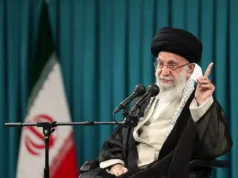Israel Watch
The House Armed Services Committee approved an amendment to the National Defense Authorization Act (NDAA) that would enable military planners in the U.S. to jointly develop an “anti-tunneling system” with their Israeli counterparts to protect against terrorist attacks from Gaza.
General Dynamics signed a $310 million agreement with Israel to supply parts for the Namer armored personnel carriers (APC). The six year deal will be funded with the help of U.S. military aid, but installations will be performed at a facility south of Tel Aviv.
Israel announced it had tested an improved rocket propulsion system used in the Arrow 2 missile defense system, correcting a weakness that had been found during another test last September.

Israel has signed a deal to produce kits for its Namer heavy troop carriers. (Photo: Staff Sgt. Abir Sultan) |
Israel agreed to buy four Sa’ar-class corvettes from Germany on May 11th at a cost of $480 million. The Israeli Navy will take delivery of the ships over the next five years and will use the vessels to protect offshore natural-gas drilling platforms. Berlin will also transfer four PAC-2 Patriot air defense batteries to Israel as part of a military aid program.
Israel Military Technology
A joint venture between Israel Aerospace Industries (IAI) and SkySapience will attempt to export the HoverMast-100 tethered drone to security and commercial customers in the U.S. The system can provide aerial reconnaissance with a smaller logistical footprint than other UAVs.
IAI plans to create a dedicated conversion line to alter Boeing 767s to multi-mission tanker transport (MMTT) configuration. IAI modified airplanes will be able to transport 200 soldiers, 60 tons of cargo, and retain their aerial refueling capability.
IAI has begun dedicating resources to developing unmanned combat air vehicles (UCAV). While the company cautions that replacing manned combat platforms could be over 15 years away, eventually they expect commanders to deploy a both manned and unmanned aircraft.
The head of Israel’s C4i corps, which coordinates different computing and communication systems, says there is a growing threat of cyber attack from Hezbollah. To prepare, the unit holds cyber war games and simulates ways of responding to attacks on critical military computer infrastructure.
Elbit Systems has created a new division aimed at developing products for the intelligence, surveillance, target acquisition, and reconnaissance (ISTAR) market. The department will help integrate electro-optics based on unmanned systems with command and control infrastructure.
The IDF tested a new Lance rocket last week. Military planners hope the missile system, guided by GPS, will be more mobile and accurate than existing optical based platforms.
Israel Military Industries (IMI) established a new department to design non-lethal technologies aimed at combatting civil unrest. As part of the initiative, the state-owned firm has begun work on a rifle-launched stun grenade based on the company’s 40mm Refaim. The unit is also developing series a of long range explosive sniffers and detectors that use laser and millimeter-wave technology.
Jordan Watch
The State Department approved the possible Foreign Military Sale of one UH-60M VIP Blackhawk helicopter and associated equipment to Jordan for an estimated cost of $21 million.
Gulf Watch
The State Department approved the multiple arms sales totalling $3.5 billion to a variety of U.S allies in the Pacific and the Middle East on May 5th. Iraq’s security forces will be able to access approximately $395 million worth of ammunition and mortars from American Ordnance and AMTEC Corp once a final agreement is reached. Alliant will also provide $14 million worth of support services to Iraq’s fleet of Cessna 208Bs.
French President Francois Hollande announced that Qatar plans to purchase 24 Rafale fighter jets from Dassault Aviation. The deal suggest that French arms exporters may be gaining back market share against U.S. rivals as both India and Egypt recently agreed to buy other Rafale fighters earlier this year. Meanwhile, U.S. aircraft maker Boeing is close to signing an agreement with Kuwait to deliver 40 F/A-18 E and F Super Hornet strike fighters at a cost of $3 billion.

A Turkish-made T129 ATAK attack helicopter. (Photo: Daily Sabah) |
Turkey Watch
The Turkish Defense Industry Executive Committee, a government body tasked with military procurement, approved two programs to indigenously create a commercial regional jet and national fighter jet. Ankara also approved the construction of the country’s first domestically built Landing Platform Dock (LPD), which will be able to carry roughly 1,200 military personnel, eight helicopters, drones, and battle tanks.
The Turkish military deployed its first two indigously-produced ground attack T129 ATAK helicopters in the southeastern city of Siirt to fight PKK fighters.
One-hundred twenty-three U.S. soldiers arrived in Turkey to train Syrian rebels fighting against the Islamic State. The opposition fighters will learn how to use machine guns and anti-tank munitions in Hirfanlı military base, Kırşehir, before returning to Syria.
Odds and Ends
Tunisia is preparing to receive its first batch of U.S.-made combat helicopters in the next few months, according to National Defense Minister Farhat Horchani.





